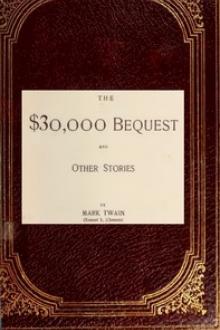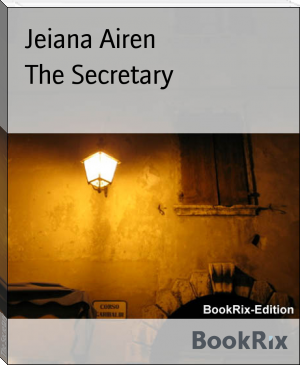The $30,000 Bequest, Mark Twain [best book club books for discussion TXT] 📗

- Author: Mark Twain
- Performer: 1406911003
Book online «The $30,000 Bequest, Mark Twain [best book club books for discussion TXT] 📗». Author Mark Twain
F. Oh, false, perjured woman, thou didst chill my blood, and makest
me a demon like thyself. I saw the ring.
A. He found it, then, or got it clandestinely; send for him,
and let him confess the truth; let his confession be sifted.
F. And you still wish to see him! I tell you, madam, he hath
already confessed, and thou knowest the darkness of thy heart.
A. What, my deceived Farcillo, that I gave him the ring, in which
all my affections were concentrated? Oh, surely not.
F. Aye, he did. Ask thy conscience, and it will speak with a voice
of thunder to thy soul.
A. He will not say so, he dare not, he cannot.
F. No, he will not say so now, because his mouth, I trust, is hushed
in death, and his body stretched to the four winds of heaven,
to be torn to pieces by carnivorous birds.
A. What, he is dead, and gone to the world of spirits with that
declaration in his mouth? Oh, unhappy man! Oh, insupportable hour!
F. Yes, and had all his sighs and looks and tears been lives, my great
revenge could have slain them all, without the least condemnation.
A. Alas! he is ushered into eternity without testing the matter
for which I am abused and sentenced and condemned to die.
F. Cursed, infernal woman! Weepest thou for him to my face? He that
hath robbed me of my peace, my energy, the whole love of my life?
Could I call the fabled Hydra, I would have him live and perish,
survive and die, until the sun itself would grow dim with age.
I would make him have the thirst of a Tantalus, and roll the
wheel of an Ixion, until the stars of heaven should quit their
brilliant stations.
A. Oh, invincible God, save me! Oh, unsupportable moment! Oh, heavy
hour! Banish me,, Farcillo—send me where no eye can ever see me, where
no sound shall ever great my ear; but, oh, slay me not, Farcillo; vent thy
rage and thy spite upon this emaciated frame of mine, only spare my life.
F. Your petitions avail nothing, cruel Amelia.
A. Oh, Farcillo, perpetrate the dark deed tomorrow; let me live
till then, for my past kindness to you, and it may be some kind
angel will show to you that I am not only the object of innocence,
but one who never loved another but your noble self.
F. Amelia, the decree has gone forth, it is to be done, and that quickly;
thou art to die, madam.
A. But half an hour allow me, to see my father and my only child,
to tell her the treachery and vanity of this world.
F. There is no alternative, there is no pause: my daughter shall
not see its deceptive mother die; your father shall not know that his
daughter fell disgraced, despised by all but her enchanting Malos.
A. Oh, Farcillo, put up thy threatening dagger into its scabbard;
let it rest and be still, just while I say one prayer for thee and
for my child.
F. It is too late, thy doom is fixed, thou hast not confessed
to Heaven or to me, my child’s protector—thou art to die.
Ye powers of earth and heaven, protect and defend me in this alone.
(STABS HER WHILE IMPLORING FOR MERCY.)
A. Oh, Farcillo, Farcillo, a guiltless death I die.
F. Die! die! die!
(Gracia enters running, falls on her knees weeping, and kisses Amelia.)
G. Oh, Farcillo, Farcillo! oh, Farcillo!
F. I am here, the genius of the age, and the avenger of my wrongs.
G. Oh, lady, speak once more; sweet Amelia, on, speak again.
Gone, gone—yes, forever gone! Farcillo, oh, cold-hearted Farcillo,
some evil fiend hath urged you to do this, Farcillo.
F. Say not so again, or you shall receive the same fate. I did
the glorious deed, madam—beware, then, how you talk.
G. I fear not your implements of war; I will let you know you have
not the power to do me harm. If you have a heart of triple brass,
it shall be reached and melted, and thy blood shall chill thy veins
and grow stiff in thy arteries. Here is the ring of the virtuous
and innocent murdered Amelia; I obtained it from Malos, who yet lives,
in hopes that he will survive the wound given him, and says he got
it clandestinely—declares Amelia to be the princess of truth and virtue,
invulnerable to anything like forgetting her first devotion to thee.
The world has heard of your conduct and your jealousy, and with
one universal voice declares her to be the best of all in piety;
that she is the star of this great universe, and a more virtuous
woman never lived since the wheels of time began. Oh, had you waited
till tomorrow, or until I had returned, some kind window would have
been opened to her relief. But, alas! she is gone—yes, forever gone,
to try the realities of an unknown world!
(Farcillo leaning over the body of Amelia.)
F. Malos not dead, and here is my ring! Oh, Amelia! falsely murdered!
Oh, bloody deed! Oh, wretch that I am! Oh, angels forgive me! Oh, God,
withhold thy vengeance! Oh, Amelia! if Heaven would make a thousand
worlds like this, set with diamonds, and all of one perfect chrysolite,
I would not have done this for them all, I would not have frowned
and cursed as I did. Oh, she was heavenly true, nursed in the very
lap of bright angels! Cursed slave that I am! Jealousy, oh! thou
infernal demon! Lost, lost to every sense of honor! Oh! Amelia—
heaven-born Amelia—dead, dead! Oh! oh! oh!—then let me die with
thee. Farewell! farewell! ye world that deceived me! (STABS HIMSELF.)
Soon after the excitement of this tragical scene was over,
and the enlisted feeling for Amelia had grown more buoyant with
Elfonzo and Ambulinia, he determined to visit his retired home,
and make the necessary improvements to enjoy a better day;
consequently he conveyed the following lines to Ambulinia:
Go tell the world that hope is glowing,
Go bid the rocks their silence break,
Go tell the stars that love is glowing,
Then bid the hero his lover take.
In the region where scarcely the foot of man hath ever trod,
where the woodman hath not found his way, lies a blooming grove,
seen only by the sun when he mounts his lofty throne, visited only
by the light of the stars, to whom are entrusted the guardianship
of earth, before the sun sinks to rest in his rosy bed. High cliffs
of rocks surround the romantic place, and in the small cavity of
the rocky wall grows the daffodil clear and pure; and as the wind
blows along the enchanting little mountain which surrounds the
lonely spot, it nourishes the flowers with the dewdrops of heaven.
Here is the seat of Elfonzo; darkness claims but little victory over
this dominion, and in vain does she spread out her gloomy wings.
Here the waters flow perpetually, and the trees lash their tops
together to bid the welcome visitor a happy muse. Elfonzo, during his
short stay in the country, had fully persuaded himself that it was
his duty to bring this solemn matter to an issue. A duty that he
individually owed, as a gentleman, to the parents of Ambulinia,
a duty in itself involving not only his own happiness and his own
standing in society, but one that called aloud the act of the parties
to make it perfect and complete. How he should communicate his
intentions to get a favorable reply, he was at a loss to know;
he knew not whether to address Esq. Valeer in prose or in poetry,
in a jocular or an argumentative manner, or whether he should use
moral suasion, legal injunction, or seizure and take by reprisal;
if it was to do the latter, he would have no difficulty in deciding
in his own mind, but his gentlemanly honor was at stake; so he
concluded to address the following letter to the father and mother
of Ambulinia, as his address in person he knew would only aggravate
the old gentleman, and perhaps his lady.
Cumming, Ga., January 22, 1844
Mr. and Mrs. Valeer—
Again I resume the pleasing task of addressing you, and once more beg
an immediate answer to my many salutations. From every circumstance
that has taken place, I feel in duty bound to comply with my obligations;
to forfeit my word would be more than I dare do; to break my pledge,
and my vows that have been witnessed, sealed, and delivered in the
presence of an unseen Deity, would be disgraceful on my part, as well
as ruinous to Ambulinia. I wish no longer to be kept in suspense
about this matter. I wish to act gentlemanly in every particular.
It is true, the promises I have made are unknown to any but Ambulinia,
and I think it unnecessary to here enumerate them, as they who
promise the most generally perform the least. Can you for a moment
doubt my sincerity or my character? My only wish is, sir, that you
may calmly and dispassionately look at the situation of the case,
and if your better judgment should dictate otherwise, my obligations
may induce me to pluck the flower that you so diametrically opposed.
We have sword by the saints—by the gods of battle, and by that
faith whereby just men are made perfect—to be united. I hope,
my dear sir, you will find it convenient as well as agreeable
to give me a favorable answer, with the signature of Mrs. Valeer,
as well as yourself.
With very great esteem,
your humble servant,
J. I. Elfonzo.
The moon and stars had grown pale when Ambulinia had retired
to rest. A crowd of unpleasant thoughts passed through her bosom.
Solitude dwelt in her chamber—no sound from the neighboring
world penetrated its stillness; it appeared a temple of silence,
of repose, and of mystery. At that moment she heard a still voice
calling her father. In an instant, like the flash of lightning,
a thought ran through her mind that it must be the bearer
of Elfonzo’s communication. “It is not a dream!” she said,
“no, I cannot read dreams. Oh! I would to Heaven I was near
that glowing eloquence—that poetical language—it charms the
mind in an inexpressible manner, and warms the coldest heart.”
While consoling herself with this strain, her father rushed into
her room almost frantic with rage, exclaiming: “Oh, Ambulinia!
Ambulinia!! undutiful, ungrateful daughter! What does this mean?
Why does this letter bear such heart-rending intelligence?
Will you quit a father’s house with this debased wretch, without a
place to lay his distracted head; going up and down the country,
with every novel object that many chance to wander through this region.
He is a pretty man to make love known to his superiors, and you,
Ambulinia, have done but little credit to yourself by honoring
his visits. Oh, wretchedness! can it be that my hopes of happiness
are forever blasted! Will you not listen to a father’s entreaties,
and pay some regard to a mother’s tears. I know, and I do pray that God
will give me fortitude to bear with this sea of troubles, and rescue
my daughter, my Ambulinia, as a brand from the eternal burning.”
“Forgive me, father, oh! forgive thy child,” replied Ambulinia.
“My heart is ready to break, when I see you in this grieved state
of agitation. Oh! think not so meanly of me, as that I mourn





Comments (0)